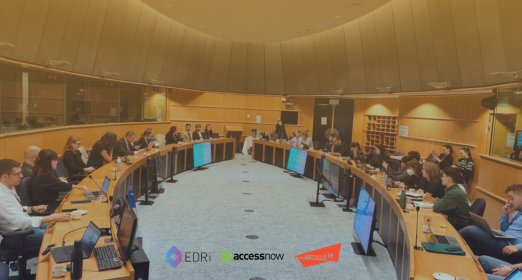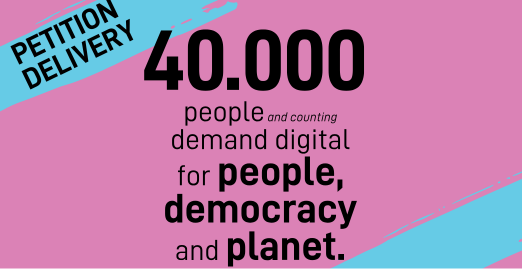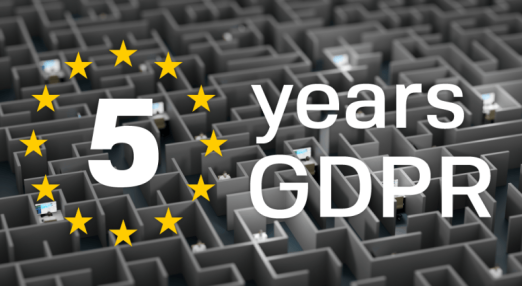EU
Filter by...
-

The Commission must uphold the AI Act and fundamental freedoms in Hungary
ECNL, Liberties and the Hungarian Civil Liberties Union called on the EU to protect Pecs Pride participants from AI surveillance.
Read more
-

The DMA is a success, it should be strengthened and expanded
Despite its somewhat disappointing enforcement so far, the EU’s Digital Market Act has become a global role model for modern antitrust policy. While Europe figures out its implementation, we should already work on expanding the law’s scope and strengthen its provisions. Here is how to make the DMA even better.
Read more
-

When data never dies: How better GDPR enforcement could minimise hate and harm
Lax enforcement of the GDPR has had far-reaching consequences for many people and collectives in the EU, especially those most vulnerable. Through a story based on real life experiences of people, this blog highlights the gap between the GDPR’s promise of protection and its current reality of weak enforcement, and the opportunity EU lawmakers have with the ongoing GDPR Procedural Regulations to take bold steps to protect our data rights.
Read more
-

The Security Playbook
EDRi affiliate SUPERRR is challenging “Security Theater” as a societal maneuver.
Read more
-

The ePrivacy Regulation proposal has been withdrawn, but the fight for your privacy is far from over
The European Commission's withdrawal of the ePrivacy Regulation proposal is a major setback for privacy rights in Europe, driven by pressure from industry interests and national security concerns. However, EDRi remains committed to advocating for stronger privacy protections, challenging commercial and state surveillance in future legislative efforts.
Read more
-

Why Ireland is the Achilles heel of the EU’s fightback against Big Tech
The recent controversies surrounding Big Tech moguls Elon Musk and Mark Zuckerberg — who are defying content moderation norms and accusing the EU of censorship — should come as no surprise to those following the tech industry closely. For over a decade, Big Tech has approached the EU's robust data protection framework as little more than a compliance checkbox, rather than a set of binding legal obligations.
Read more
-

Deported for reporting a crime: the paradox of securitisation policies
The review of the Return Directive, which governs detention and deportation procedures in the EU, should not lead to the criminalisation of undocumented people. Rather, it should uphold their fundamental right to personal data protection by establishing firewalls that allow them to report crimes without fears of being deported.
Read more
-

EDRi and members take EU decision-makers through 20 years of digital policy
This September, EDRi, Access Now and ARTICLE 19 took Parliamentarians through a rollercoaster ride of all things digital policy in the European Union. From the early internet and initial experiments in platform regulation, through more recent regulatory innovations, and finally to questions of security and surveillance, we shared a digital rights perspective of the good, the bad and the ugly of digital policy in the EU.
Read more
-

European decision-makers accept petition signatures at Tech and Society Summit
Over 40,000 people supported our petition – also co-signed by more than 30 civil society organisations – urging EU decision-makers to support the people’s visions of positive digital futures. Seven Members of the European Parliament accepted the petition signatures at the civil-society hosted Tech and Society Summit in Brussels on October 1.
Read more
-

How to fight Biometric Mass Surveillance after the AI Act: A legal and practical guide
The EU's Artificial Intelligence Act has been adopted, laying out an in-principle ban on live mass facial recognition and other public biometric surveillance by police. Yet the wide exceptions to this ban may pave the way to legitimise the use of these systems. This living guide, for civil society organisations, communities and activists, charts a human rights-based approach for how to keep resisting biometric mass surveillance practices now and in the future
Read more
-

It’s time for a heart-to-heart about the EU’s surveillance agenda
The EU prides itself on its worldwide norm-setting influence in the fields of data protection and artificial intelligence regulation. Still, it is not always for the best when it comes to digital state surveillance. Privacy is safety. As we approach the European elections in June, it’s time to discuss the EU's role in shaping how technologies are developed and used.
Read more
-

5 years of the GDPR: National authorities let down European legislator
On 25 May 2018, the General Data Protection Regulation (GDPR) came into force, promising to be the strongest set of data protection rules to enhance our privacy. While the contents of EU data protection rules stayed largely the same, the alleged big change was the GDPR's strict enforcement. 5 years later, national authorities and courts largely leave the European legislator in the lurch – despite a budget of more than €330 million in 2022.
Read more
